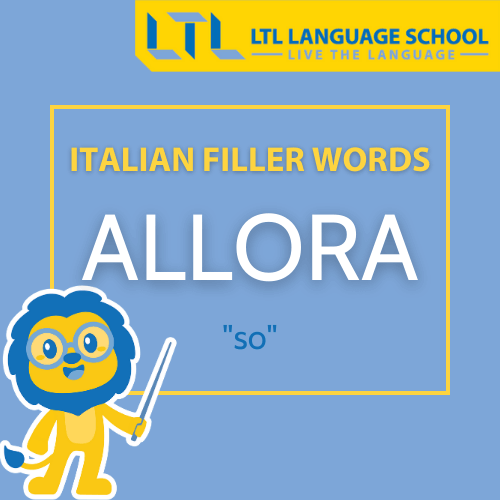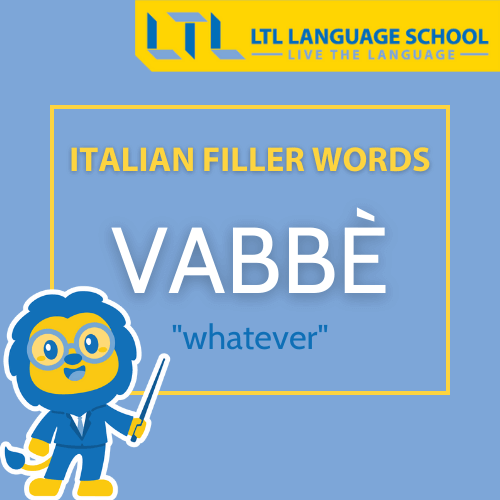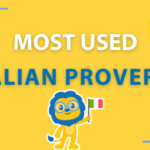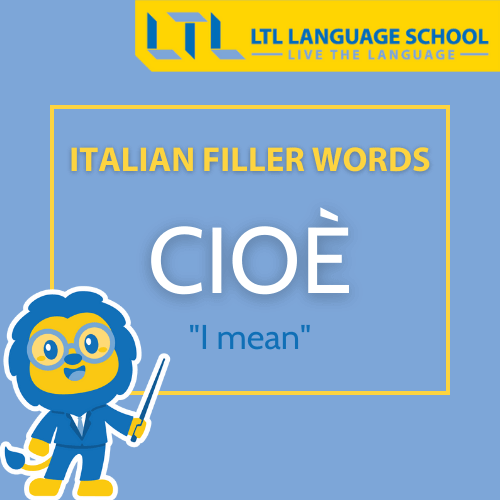10 Italian Filler Words + How to Use Them || Includes Example Dialogues
How to Use the 10 Most Popular Italian Filler Words || Sound Like a Native 😎
Filler words are very useful tools to buy time to think while speaking, and they’re widely used by native Italian speakers in everyday conversations.
If you want to sound more Italian, then learning them can be a good idea!
In this article, you’ll learn the top 10 Italian filler words, along with some real-life usage examples.
Italian Filler Words || Allora
Italian Filler Words || Vabbè
Italian Filler Words || Cioè
Italian Filler Words || Insomma
Italian Filler Words || Comunque
Italian Filler Words || Praticamente
Italian Filler Words || Dai
Italian Filler Words || Poi/Poi boh/Ma poi
Italian Filler Words || Che altro
Italian Filler Words || Tipo
Italian Filler Words || FAQs
Top 10 Italian Filler Words || Allora
“Allora” is probably the most widely used Italian filler word. Let’s see how to use it correctly.
You can use it at the beginning of a sentence, to start a conversation.
Here are some examples.
If a friend had to take an exam, and you want to ask him how it went, you can ask him:
“Allora, com’è andata?” (So, how did it go?)
If your friend needed to let you know if he wanted to go to a movie or restaurant tonight, you can ask him:
“Allora, hai deciso cosa fare?” (So, have you decided what to do?)
If it is implied what you are referring to, for example, if a friend has just ended a phone call, and you want to know the content of the call, you can ask him:
“Allora?”
You can also use “allora” to introduce a speech, to begin to explain something.
Your Italian teacher might tell you:

“Allora, oggi parleremo dei verbi irregolari.” (So, today we are going to talk about irregular verbs)
Or:
“Allora, cominciamo.” (So, let’s start)
“Allora” can be used to call attention if someone disturbs the lesson (especially if he/she already told you to be quiet or lower the volume):
“Allora, basta!” (Enough!)
or even a simple:
“Allora!!” (Stop it!)
When this word is used alone, it is important to pay attention to the tone.
Here is a statement, whereas before, it used the tone of a question.
“Allora” can also mean “then“, or “in that case.”
A: “Non ho voglia di uscire oggi…” (I don’t feel like going out today…)
B: “Allora stiamo a casa!” (Then let’s stay home!)
You can also use “allora” at the beginning of a sentence as a classic filler word instead of “eeeeeeh…“
For example, if you are in a gelateria and they ask you what flavours you want, you can say:
“Allora… per me cioccolato e stracciatella, grazie.” (Chocolate and stracciatella for me, please.)
If your friend asks you what you had for lunch:
“Alloooora… boh, non mi ricordo. Ah sì, le lasagne.” (Ehm… I don’t remember. Oh, yes, I had lasagna.)

Celebrate in Style || 6 of the Very Best Italian Festivals
Immerse yourself in Italian culture with our guide to the top 6 festivals in the country. You’ll also learn the most useful words and phrases used during them.
Top 10 Italian Filler Words || Vabbè
“Vabbè” is another very popular filler word in Italian, which can be translated as “whatever” and is short for “va bene.”
You can use it to change the subject:
… “Vabbè basta, parliamo di qualcos’altro.” (That’s enough, let’s talk about something else.)
… “Vabbè, te invece cosa racconti?” (Anyways, what’s up with you?)
Or to express a contrary opinion in response to a complaint:
A: “Ti ho mandato un messaggio ieri, ma non mi hai risposto.” (I texted you yesterday, but you didn’t reply.)
B: “Vabbè ma mi hai scritto alle due, io dormivo.” (You wrote me at two o’clock, I was asleep.)

“Vabbè” is also as a typical way of introducing a passive-aggressive comment when arguing with someone:
“Vabbè allora non dico più niente.” (Whatever, I’ll just not speak anymore)
Notice two Italian filler words together here! Not uncommon.
“Vabbè allora hai ragione tu.” (Whatever, you’re right)
Or a simple:
“Vabbè dai.” (Whatever)
or even, when you’re completely done (but still don’t want to end the fight):
“Vabbè“

Italian Proverbs || 10 of the Most Used Proverbs in Italy (by Native Speakers)
Learning Italian proverbs and idioms is a great way to understand the language as spoken by natives. Here are some of our favourites.
Top 10 Italian Filler Words || Cioè
“Cioè” is used especially among young people, who tend to say it every other word.
It is similar to the English “I mean.“

It’s better not to use it very often, but let’s look at an example:
A: “Ho di nuovo perso il telefono.” (I lost my phone again.)
B: “Cioè, io non ho parole. Come fai a perderlo sempre?” (I mean, I have no words. How do you always lose it?)
A: “Ah boh… cioè, era qui nella borsa! Dai, aiutami a cercarlo.” (I don’t know…I mean, it was here in the bag! Come on, help me look for it.)
Top 10 Italian Filler Words || Insomma
The fourth Italian filler word is “insomma“.
Italian speakers say “insomma” when they are trying to remember something (you can also use “dai” with this same meaning):
Devo andare al negozio che mi si è rotto quel coso per il telefono, quello che si attacca quando sei in giro dai… insomma la power bank! (I have to go to the store ’cause I broke that thing for my phone, the one that you plug in when you’re out…I mean… the power bank!)
It’s also used when you’re telling a story and you’re thinking about what to say or meaning “long story short“/”in short“:

A: “Allora ieri ero in ufficio e insommaaaa… è arrivato il mio collega, quello che hai conosciuto anche te, e insomma all’inizio non l’ho neanche riconosciuto.” (So yesterday I was in the office aaand… my colleague came in, the one you also met, and I mean at first I didn’t even recognize him.)
B: “Perché?” (Why?)
A: “Ah era tanto che diceva che voleva cambiare qualcosa e insomma si è fatto pelato!” (He had been saying for a long time that he wanted to change something… long story short, he went bald!)
“Insomma” is also used to express impatience:
“Insomma, basta!” (Stop it!)
“Insomma, me lo dici si o no?” (Are you gonna tell me or not?)
If you’re struggling to do something, for example when you’ve been trying to open a plastic bag at the supermarket for a whole minute and it’s getting on your nerves, you can say:
“Insomma!!” (Oh, come on!)
You can also use “dai” with this same meaning.

Learn Italian with Netflix || 5 of the Best Italian Series on Netflix
Immerse yourself in the Italian storytelling with our top 5 Italian series on Netflix. Dive into the culture, drama and romance. Binge-worthy guaranteed!
Top 10 Italian Filler Words || Comunque
“Comunque” is used at the beginning of sentences to change the subject, kind of like “vabbé”:
“Comunque, cos’è che stavi dicendo prima?” (Anyway, what were you saying before?)

Or to express a comment, either positive or negative:
“Comunque è proprio bella!” (Anyway, she’s really beautiful!)
“Comunque fa troppo caldo.” (Anyway, it’s too hot.)
Or even just to start talking about something:
“Comunqueee… ieri ho visto quel film ma non era un granché.” (Anyway…I watched that movie yesterday but it wasn’t very good.)
Top 10 Italian Filler Words || Praticamente
“Praticamente” literally means “practically,” but it is also used with the meaning of “pretty much.“
You can use it at the beginning of a sentence to explain something:
A: “Cos’è successo?” (What happened?)
B: “Praticamente abbiamo litigato e non ci parliamo da ieri.” (We had a fight and haven’t spoken since yesterday.)
A: “Come ci si iscrive a questo corso?” (How do you register for this course?)
B: “Praticamente, prima scarichi il modulo, lo compili e lo firmi. Poi lo carichi, inserisci la tua foto, paghi la tassa di iscrizione e ti arriva la mail di conferma.” (Basically, first you download the form, fill it out and sign it. Then you upload it, insert your photo, pay the application fee, and you get the confirmation email.)
Let’s now look at some examples where it’s basically used as “pretty much“:

A: “Hai finito di leggere quel libro?” (Did you finish reading that book?)
B: “Praticamente sì, mi mancano 10 pagine.” (Pretty much yes, I have 10 pages to go.)
A: “Vado a fare la spesa?” (Do I need to go grocery shopping?)
B: “Sì, il frigo è praticamente vuoto.” (Yes, the refrigerator is pretty much empty.)
You can also used basically anywhere mid-sentence, to buy time to think:
“Praticamenteeeeeee… ieri ho incontrato Matteo e mi ha raccontato della vacanza con la sua ragazza, e niente… praticamente… hanno litigato tutto il tempo… quiiiindi… mi sa che la vuole lasciare.” (So… yesterday I met Matteo and he told me about the vacation with his girlfriend, and well… basically… they were fighting the whole time… so… I guess he wants to break up with her.)
Notice that other filler words (“e niente…” and “quindi“) were used in this example.

The Very Best Female Italian Singers || Our Top 10
Start learning Italian with music. Discover the best female Italian singers and listen to their top hits. Are you ready to start singing?
Top 10 Italian Filler Words || Dai
“Dai“, which is literally the imperative form of the verb “to give”, is widely used in the Italian language to express a variety of meanings.
Let’s look at a few examples.
When you do not remember something, or you are trying to make the other person understand or remember something:

A: “Dove hai comprato quella maglia?” (Where did you get that shirt?)
B: “In quel negozio vicino al ristorante dove siamo stati ieri, dai, quello dove lavorava Marco, ti ricordi?” (At that store near the restaurant where we were yesterday, come on, the one where Marco used to work, remember?)
A: “No…”
B: “Dai, quello con l’insegna gialla, hai presente?” (Come on, the one with the yellow sign, you know?)
It’s also used to express disappointment…
A: “Non penso di venire alla festa di domani”
B: “Dai, perché no?”
…or to push to start an action:
A: “Dai, mettiamoci a fare i compiti”
Top 10 Italian Filler Words || Poi/Poi boh/Ma poi
“Poi” has a variety of meanings. You can use it to give a reason why you think something is wrong:
A: “Si lamenta che non ci sono mai, ma ho un esame la settimana prossima, non posso uscire!” (She complains that I’m never available, but I have an exam next week, I can’t go out!)
B: “(Ma) poi quando deve studiare lei si chiude in casa per un mese.” (She shouldn’t be speaking, she’s the one who locks herself in for a month when she has to study.)
Another example:

A: “Ci è rimasto male perché non gli ho comprato un regalo.” (He was disappointed because I didn’t buy him a present.)
B: “Ma ti aveva detto che era il suo compleanno?” (But did he tell you it was his birthday?)
C: “(Ma) poi lo conosci da una settimana!” (But you’ve only known him for a week!)
You can use “poi” or “ma poi” to ask for an update on something:
A: “Ti ricordi quella storia che ti avevo raccontato?” (Do you remember that story I told you?)
B: “Si, si, ma poi?” (Yes, but what happened then?)
“Poi” can be used as “then” to talk about a sequence of actions, or to list things:
A: “Cos’hai fatto domenica?” (What did you do on Sunday?)
B: “Ah niente ho dormito fino alle 11 che ero stanca morta, poi sono andata a fare la spesa, poi ho fatto da mangiare poiiiiii… ah sì, ho fatto un giro al parco.” (Nothing, I slept until 11 o’clock as I was very tired, then I went grocery shopping, then I cooked and then… ah yes, I went for a walk in the park.)
“Poi boh” can be used when listing things you’re complaining about:
A: “Come va col tuo ragazzo?” (How are things with your boyfriend?)
B: “Ah niente… ultimamente le cose non vanno molto bene, lui è sempre stanco, non ha voglia di far niente, non mi fa più regali… poi boh, non mi manda mai un messaggio.” (Ah nothing… lately things are not going very well, he is always tired, he doesn’t feel like doing anything, he doesn’t buy me gifts anymore… then I don’t know… he never texts me.)
Other Italian filler words, such as “ah niente“, “ah sì” were also used in this example. Filler words such as “ah“, “niente“, “ah, niente“,”ah, sì“, are used at the beginning of a sentence.
- “Ah” can be used at the beginning of any sentence.
- “Ah sì” gives the impression you just remembered another thing or another detail.
- “Niente“, “ah niente” are used to introduce something not particularly interesting or a bit disappointing.

The 10 Best Italian Game Shows || Learn Italian Watching TV
Watching a TV quiz or game show is a great way to learn Italian while having fun. Find out the 10 most popular Italian game shows and how you can watch them.
Top 10 Italian Filler Words || Che altro
This filler phrase is a little more formal than the others. You can safely use it in slightly more formal situations as well as in everyday life.
“Che altro” literally translates as “what else“.

You can use it when you are making a list of things or laying out concepts, to buy some time and think about what to say next.
A: “Devo andare a fare la spesa, passare in banca… che altro? Ah sì devo anche fare quella telefonata.” (I have to go shopping, stop by the bank-what else? Ah yes I also have to make that phone call.)
A: “Penso che gli aspetti più difficili della lingua italiana siano i verbi irregolari, i maschili e femminili…che altro… anche gli articoli e le preposizioni non sono semplici.” (I think the most difficult aspects of the Italian language are irregular verbs, masculine and feminine … what else … also articles and prepositions are not easy.)
Top 10 Italian Filler Words || Tipo
“Tipo” is the exact equivalent of the English “like” and is one of the most common filler words in the Italian language.

Tipo is a colloquial expression, which should not be used in formal contexts.
Even with friends, it is good not to abuse it (although it is also the habit of many Italians to use it every 5th word).
Let’s see below some examples of how this word can be used in conversations among friends.
A: Ma poi hai detto a Luca che Marta non vuole venire al suo compleanno? (Did you tell Luca that Marta doesn’t want to come to his birthday?)
B: No, tipo ieri l’ho anche visto e mi ha chiesto se sapevo qualcosa, ma io tipo non sapevo cosa dire…e allora niente ho cambiato argomento. (No, like yesterday I also saw him and he asked me if I knew anything, but I kind of didn’t know what to say…so I just changed the subject.)
A: Cosa ti piace fare? (What do you like to do?)
B: Cosa mi piace fare? Boh, tipo guardare i film, le serie tv… oppure tipo la sera mi piace anche fare una passeggiata col mio cane. (What do I like to do? Boh, like watch movies, TV series…or like in the evening I also like to take a walk with my dog.)

“Tipo” or “ma tipo” are also often used to introduce a topic, question, or state an idea (again, this is ok only in colloquial contexts):
Ma tipo, se domani non andassi a lavorare? (But like, what if I don’t go to work tomorrow?)
Ma tipo, hai visto cos’ha postato su Instagram? (But like, did you see what he/she posted on Instagram?)
Those were the most used Italian filler words that will help you sound more natural in Italian. Do you know any others? Tell us in the comments below.
Top 10 Italian Filler Words || FAQs
How do you use the Italian filler word “allora”?
You can use it at the beginning of a sentence, to start a conversation in which you will ask your interlocutor for some information about himself or something you had already talked about.
If a friend had to take an exam, and you want to ask him how it went, you can ask him:
“Allora, com’è andata?” (So, how did it go?)
If your friend needed to let you know if he wanted to go to a movie or restaurant tonight, you can ask him:
“Allora, hai deciso cosa fare?” (So, have you decided what to do?)
What’s the English equivalent of the Italian filler word “tipo”?
“Tipo” is the exact equivalent of the English “like“
What are Italian filler words?
Filler words are very useful tools to buy time to think while speaking, and they’re widely used by native Italian speakers in everyday conversations.
How do you use the Italian filler word “praticamente”?
“Praticamente” literally means “practically,” but it is also used with the meaning of “pretty much.“
You can use it at the beginning of a sentence to explain something:
A: “Cos’è successo?” (What happened?)
B: “Praticamente abbiamo litigato e non ci parliamo da ieri.” (We had a fight and haven’t spoken since yesterday.)
Want More From LTL?
FANCY LEARNING ITALIAN? Check out our online Italian courses here.
We offer a 7-day free trial to all online students where you can study Italian 24/7. It doesn’t just end with Italian.
Come and be a part of our amazing community.









